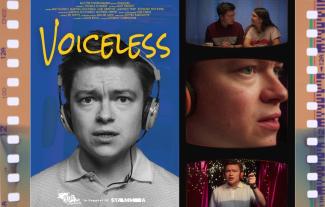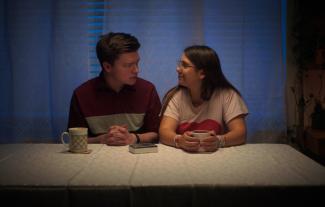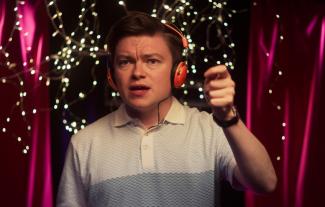My short film 'Voiceless'

Actor and filmmaker Matt Hansen tells us about his love of performing and his new project about stammering, which is about to hit the film festivals.
As a stammerer, it might be surprising to some that I entered a profession reliant on using one's voice. However, performance has been the most helpful management outlet I've ever found.
Although I was a reluctant speaker as a child and would barely string more than a few words together (to the extent that I saw a speech therapist when I was three), my stammering didn't properly present itself until my mid-teens. The moments my stammer chooses to come out and play tend to be the more casual and mundane, rather than in moments of heightened emotion or pressure. It happens on particular words and sounds, such as when I'm about to ask a 'who/what/when/why' question in normal conversation. For some reason, the word 'prescription' in the pharmacy also trips me up.
Performing provided me with a new sense of freedom and fluency, and this is what I decided to focus on when writing our second project, Voiceless.
I don't stammer in every sentence I say; sometimes it sneaks up on me, other times I become aware of it building just before I say the sound, but it's a part of my life of which I'm always aware. In terms of strategies I use, I tend to control my breath and rate of speech, or reword what I'm trying to say in the moment.
Performing
As an actor, I began by training with the National Youth Theatre and performed in plays with companies at the Cheltenham Playhouse and the Kings Theatre Gloucester during my time at university, where I studied English. After graduating, I acted in short and low-budget feature films, educational videos and theatre productions.
Performing provided me with a new sense of freedom and fluency, and this is what I decided to focus on when writing our second project, Voiceless. More specifically, trying your best to manage, or at least work around, your insecurities about your speech by exploring new forms of self-expression.
In Voiceless I play Joe, who is encouraged to attend his friend's writing and performing group. However, he's pushed too far too soon and becomes dejected at his apparent inability and embarrassing public failure. Then, he decides to persevere and try again, using a particular strategy to enable him to perform on stage to a group of strangers. Most importantly, he enjoys his second performance even though it might not have been 'perfect', and he feels support from the group as their perceptions around his stammer have changed.

Stammering was a new aspect of my life to write about, and I think a surprising one for many friends of mine who weren't aware of the effect my stammer had on me mentally. What I write is always raw, but poignant and moving — that's what I try to do — but of course that means it's exposing, yet decorated with humour. It was certainly intimidating, but cathartic, to sit with a blank document and ask myself 'What do I actually feel about this?' Thankfully, Martina Zucconelli, Thomas Schubert, Matt Zeffert, Andrew Waddle and the whole team were understanding, respectful and supportive. Stammering was a new theme for them and I appreciated that their ultimate goal was to make a story that would resonate with audiences and shine a light on stammering, hopefully in a new way.
I'd like to encourage stammerers to try not to be inhibited by it, have confidence and push themselves if they can.
A central piece of the puzzle was getting STAMMA on board for the film's ending message. Jane Powell and Kirsten Howells showed passionate enthusiasm and creative help, making suggestions for ways to uplevel the representation of stammering in the script. We really connected on one of the fundamental aims of the film: making it clear that stammering is not 'overcome', which is often the phrase used and is rather a faux pas. Instead, it's about stammer management and others allowing that person to finish what they are saying, and the speaker enjoying their speech. We felt it was vital that Joe enjoys his second performance and this was something I reminded myself of as we shot that scene.

Representation
The aim of the film is for stammerers to be represented positively and show that they can challenge their insecurities on their own terms. I'd like to encourage stammerers to try not to be inhibited by it, have confidence and push themselves if they can. Joe tried again and felt an amazing sense of achievement and pride, even though his performance wasn't 'perfect'. He did it for himself, proved it to himself, and grew as a result.
Of course, stammering is an experience unique to the individual. It's impossible to do a universal, catch-all representation; I can only present my own experience, but hopefully others will still see parts of their own stammering experiences in Voiceless. Honestly, the best experience of Voiceless' festival journey so far was when a young chap came up to me after the screening at the London Film Club in June. His stammer was far more prominent than mine — much nearer to Joe's — and he told me how much he enjoyed and appreciated the film. He was just a normal attendee and had no idea what Voiceless was going to be, but I could tell he was deeply moved by it, which was more important to me than any festival selection or award. I was extremely grateful for that interaction.
Voiceless is currently receiving festival selections around the UK and the world. The next two festival screenings are the London Rolling Film Festival (6th September) and the Worcester Film Festival (24th – 27th September, exact screening date TBA). It will also be available online from the 11th – 14th September as part of the Venezia Shorts Film Festival and is eligible for the Venezia Shorts Virtual Edition Award.
There'll be a free private screening of Voiceless at the ArtHouse cinema in Crouch End, London on Friday 22nd August. If you'd like to attend, email Matt at blueink.ent.office@gmail.com for invite details.
Follow Voiceless and its production company Blue Ink on Instagram: @voiceless_short_film and @blue_ink_entertainment.
Write for the site
Would you like to write an article? Share your experiences, give us your opinions or tell us about something you've created. See Submit Something For The Site or email editor@stamma.org


































